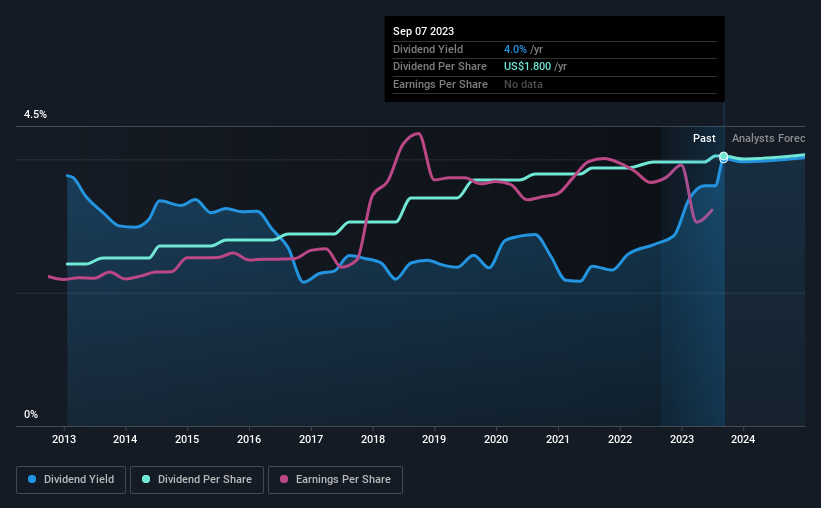Community Bank System, Inc.'s (NYSE:CBU) dividend will be increasing from last year's payment of the same period to $0.45 on 10th of October. This makes the dividend yield about the same as the industry average at 4.0%.
Check out our latest analysis for Community Bank System
Community Bank System's Payment Expected To Have Solid Earnings Coverage
Unless the payments are sustainable, the dividend yield doesn't mean too much.
Having distributed dividends for at least 10 years, Community Bank System has a long history of paying out a part of its earnings to shareholders. Past distributions do not necessarily guarantee future ones, but Community Bank System's payout ratio of 61% is a good sign as this means that earnings decently cover dividends.
Looking forward, earnings per share is forecast to rise by 12.4% over the next year. If the dividend continues on this path, the future payout ratio could be 57% by next year, which we think can be pretty sustainable going forward.

Community Bank System Has A Solid Track Record
Even over a long history of paying dividends, the company's distributions have been remarkably stable. Since 2013, the annual payment back then was $1.08, compared to the most recent full-year payment of $1.80. This means that it has been growing its distributions at 5.2% per annum over that time. The dividend has been growing very nicely for a number of years, and has given its shareholders some nice income in their portfolios.
Dividend Growth May Be Hard To Come By
The company's investors will be pleased to have been receiving dividend income for some time. However, initial appearances might be deceiving. It's not great to see that Community Bank System's earnings per share has fallen at approximately 5.1% per year over the past five years. Declining earnings will inevitably lead to the company paying a lower dividend in line with lower profits. It's not all bad news though, as the earnings are predicted to rise over the next 12 months - we would just be a bit cautious until this can turn into a longer term trend.
In Summary
Overall, it's great to see the dividend being raised and that it is still in a sustainable range. With shrinking earnings, the company may see some issues maintaining the dividend even though they look pretty sustainable for now. The payment isn't stellar, but it could make a decent addition to a dividend portfolio.
Companies possessing a stable dividend policy will likely enjoy greater investor interest than those suffering from a more inconsistent approach. At the same time, there are other factors our readers should be conscious of before pouring capital into a stock. Without at least some growth in earnings per share over time, the dividend will eventually come under pressure either from competition or inflation. Businesses can change though, and we think it would make sense to see what analysts are forecasting for the company. Is Community Bank System not quite the opportunity you were looking for? Why not check out our selection of top dividend stocks.
New: AI Stock Screener & Alerts
Our new AI Stock Screener scans the market every day to uncover opportunities.
• Dividend Powerhouses (3%+ Yield)
• Undervalued Small Caps with Insider Buying
• High growth Tech and AI Companies
Or build your own from over 50 metrics.
Have feedback on this article? Concerned about the content? Get in touch with us directly. Alternatively, email editorial-team (at) simplywallst.com.
This article by Simply Wall St is general in nature. We provide commentary based on historical data and analyst forecasts only using an unbiased methodology and our articles are not intended to be financial advice. It does not constitute a recommendation to buy or sell any stock, and does not take account of your objectives, or your financial situation. We aim to bring you long-term focused analysis driven by fundamental data. Note that our analysis may not factor in the latest price-sensitive company announcements or qualitative material. Simply Wall St has no position in any stocks mentioned.
About NYSE:CBU
Community Financial System
Operates as the bank holding company for Community Bank, N.A.
Flawless balance sheet with solid track record and pays a dividend.
Similar Companies
Market Insights
Community Narratives



